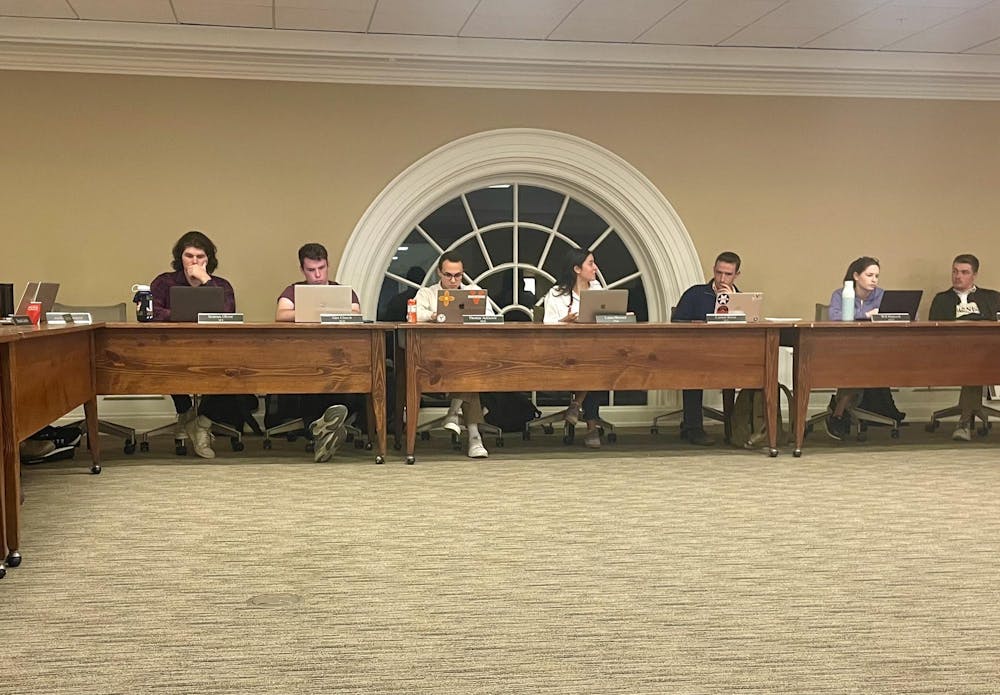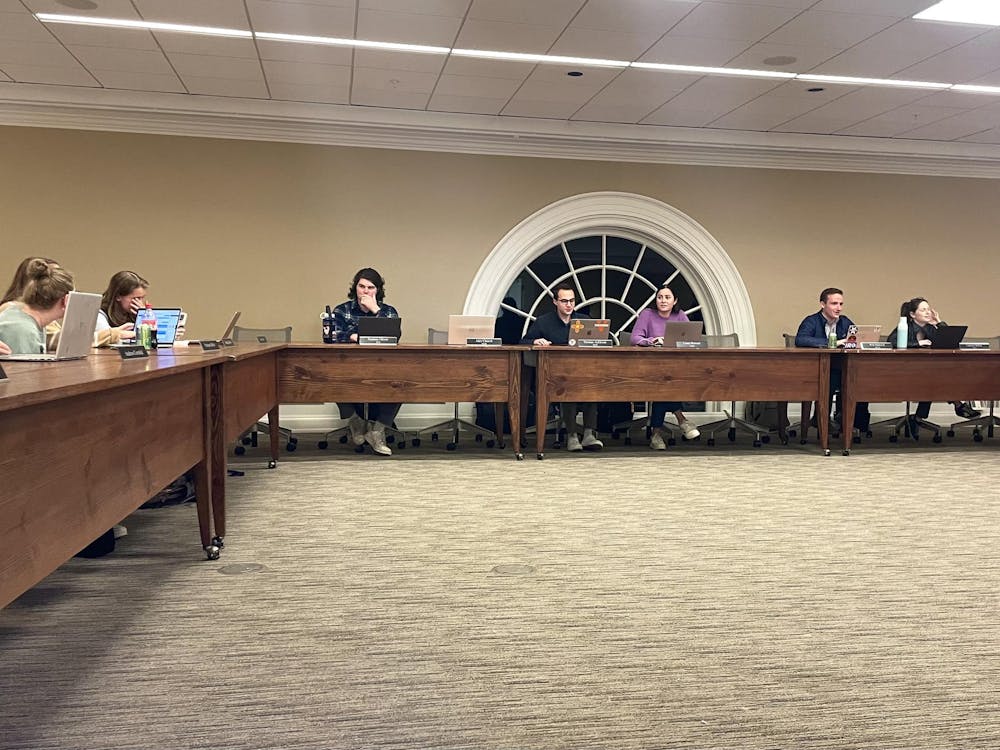The Honor Committee met Sunday to discuss the implementation of a new sanctioning policy passed Oct. 23, which introduced a “pre-sanctioning” process and expanded the role of the Counsel for the Community in sanctioning decisions. The Committee debated the level of discretion that the Counsel should receive in considering sanctions, as opposed to strictly following training guidelines. Additionally, the Committee brainstormed ideas for fall semester “finals pushes” — support initiatives offered to students during final exams — including coffee tabs and energy drink handouts.
The new sanctioning bylaws grant the Counsel for the Community — support officers representing both the reporter of an offense and the Community of Trust in Honor trials — the ability to present their own sanctioning arguments before a Panel for Sanctions, rather than solely relying on the reporter's perspective.
This shift addressed concerns that the reporter’s viewpoint — usually presented by a University professor — had been overemphasized, while the interests of the broader Community of Trust were underrepresented. While the reporter maintains their own testimony and reasoning for sanctions, the Counsel for the Community is intended to represent the University interests as a whole. The Committee’s Sanctioning Working Group — a subcommittee tasked with forming new sanctions and sanctioning procedures — proposed the bylaws Oct. 6, and the Committee passed the bylaws Oct. 23.
At the Oct. 6 meeting, SWG members introduced a “framework” to guide the Counsel for the Community in deciding which sanctions to recommend. The sanctioning framework grouped a guilty student’s offense into four levels of severity, ranging from “least severe” to “most severe,” with the levels corresponding with the severity of a sanction.
For example, least severe violations — such as a misunderstanding of the Community of Trust — involve minimal gain for the student and would yield rehabilitative sanctions. Less severe offenses involve intent, but the nature and circumstances of the offense make it less harmful. For severe offenses, there are deterrence-focused sanctions. Most severe offenses are premeditated and systematic that may result in suspension or expulsion.
In terms of implementation, the Committee is currently training support officers on the updated sanctioning process. Laura Howard, chair of the Committee and fourth-year College student, said the primary question for training is whether Counsel members should be instructed to follow the severity-level framework or to rely on their own judgment when selecting appropriate sanctions. One argument against the severity-level framework is that it constrains Counsel members to a single approach, limiting flexibility in developing sanctioning arguments.
“The part that we are [considering] is how to continue the implementation,” Howard said. “The question is if we should have [a set] framework, or if we should [give] the Counsel for the Community the discretion themselves.”
Will Hancock, vice chair for the undergraduate community and third-year College student, chairs the SWG. Hancock supports the framework and said that the severity-assessment was designed with room for the Counsel’s judgment, and does not create a binding line of reasoning for sanctioning.
“[The Counsel for the Community] are looking at the guidelines that we already created [and] then kind of base their own approach on it,” Hancock said. “Every case is unique … but [they will] have some kind of grounding.”
Alexander Church, vice chair for hearings and third-year Engineering student, said he was concerned about anchoring Counsel to the severity-based scale, potentially limiting thoughtful consideration.
Church said that the Counsel should approach sanctioning by considering the context of each case through a “decision-tree” method — a system where decision-makers evaluate criteria at each step before moving onto another option. In a Panel for Sanctions, representatives use this approach by beginning with the most severe option, permanent removal, and moving down through temporary removal and rehabilitative sanctions if the previous levels are considered inappropriate for that offense. At each stage, representatives deliberate on the evidence and reasoning. Church said that this model provides flexibility and avoids the constraints of a match-based framework.
“Frameworks can be an anchoring issue,” Church said. “The way that we are teaching representatives to [consider sanctions] … is the most effective way to set a framework.”
Hancock said that the severity levels intend to ground the Counsel’s thought-process rather than to constrain them. He said that there is a trust in the Counsel to exercise discretion and adapt their arguments to the specifics of each case.
“I trust the Counsel for the Community,” Hancock said. “The solution that we've gotten to now thankfully does give them more discretion, rather than having them tie it to the sanction guidelines.”
Howard said that the Committee generally agreed on the importance of balancing structured training, through the severity guidelines, with allowing Counsel discretion in sanctioning judgments. The Committee’s senior support officers have briefed their respective support officer pools on the sanctioning bylaws — except for the Counsel pool, whose specific training will occur over the next two weeks.
In addition to sanctioning policy, the Committee discussed ideas for “finals pushes” — events and giveaways sponsored by the Committee to support students during finals, which are set to begin Dec. 9. Last semester, these included Chick-fil-A lunches and distributing snacks and energy drinks at libraries. The Committee plans to continue with coffee and energy drink handouts this semester. With finals approaching in one month, Howard opened a conversation for brainstorming this semester’s events.
Penelope Molitz, third-year School of Education Rep., said that labeling finals push events as school-specific handouts might be beneficial to group students together, as finals periods can be stressful to navigate alone.
“I found that finals are really isolating,” Molitz said. “The Education School loves community … [that’s] something to be mindful of at other schools too.”
The Committee agreed that incorporating school-specific events would be beneficial for future finals push efforts and will gather concepts for different events catered towards each school. They will continue brainstorming these initiatives in preparation for finals, which begin on Dec. 9. The Committee is scheduled to reconvene Nov. 17 at 7 p.m. for their second-to-last meeting of the semester.





